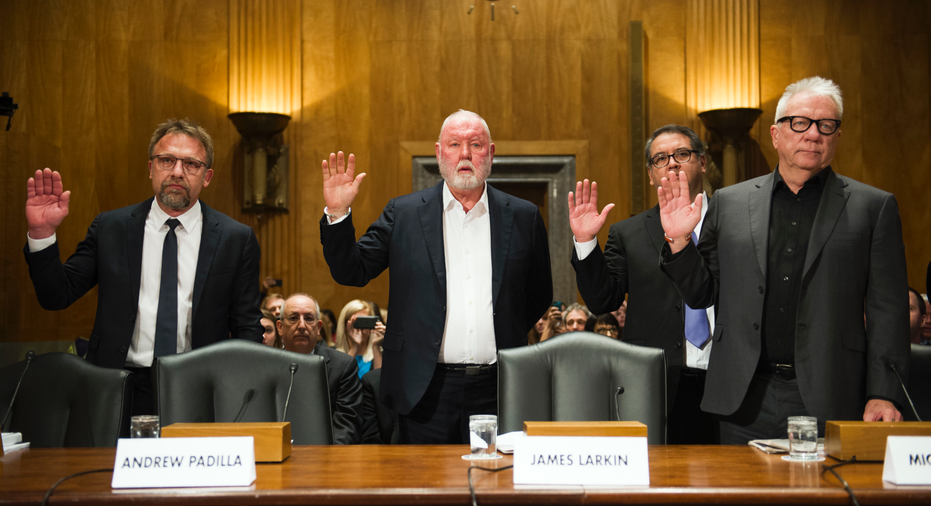Judge allows money laundering charges against Backpage execs

SACRAMENTO, Calif. – California prosecutors can bring money laundering charges against the creators of a website that prosecutors label an online brothel, a judge ruled Wednesday. But he dismissed other charges months after another judge threw out the entire case as violating free speech and federal protections.
Prosecutors filed new and expanded charges against Backpage.com chief executive Carl Ferrer and website founders Michael Lacey and James Larkin this spring. The three pleaded not guilty after the judge allowed the money laundering charges.
Sacramento County Superior Court Judge Larry Brown also dismissed 15 pimping conspiracy and other charges against Backpage.com's operators.
He ruled that those charges relate to their publishing of sex-related advertisements and cannot be filed because of a federal law protecting free speech that grants immunity to websites that post content created by others.
Brown sided with California's state attorney general that 25 of the original 27 money laundering charges alleging illegal bank fraud can proceed.
Prosecutors have said that Backpage's operators illegally funneled money through multiple companies and created various websites to get around banks that refused to process transactions.
Backpage.com is a classified advertising webpage that prosecutors say gets more than 90 percent of its revenue — millions of dollars each month — from thinly disguised ads for prostitution.
The website shuttered its adult services section in January, but officials have said much of the same advertising has migrated to the site's dating and massage sections with similar provocative photographs and wording.
California prosecutors and U.S. Senate investigators contend that Backpage leads the market in commercial sex advertising and has been linked to hundreds of reported cases of sex trafficking, including the trafficking of children.
But federal and state officials have been struggling with how to deal with the website without violating free speech protections. The U.S. Supreme Court in January left in place a different lower-court ruling that said Backpage's ads are protected by the federal Communications Decency Act, which is designed to protect internet publishers.
Congress is considering amending the act to omit sites that aid sex trafficking and to specifically allow states to file criminal charges.
Brown said Congress would have to act to allow criminal charges related to internet publishing.
Brown said in court that federal law provides broad immunity but added that "immunity afforded to internet service providers is not without limit. Even the most ardent defenders of a vigorous world wide web would have to concede that if a provider engaged in their own criminal acts, versus those of their customers, immunity must fail."
Prosecutors and defense attorneys each praised their partial victories.
"We're pleased that all of the charges that have to do with pimping or prostitution or content of the website have all been thrown out, and we think that's the right ruling in support of internet free speech and the First Amendment," said defense attorney Jim Grant.
Defense attorney Cristina Claypoole Arguedas labeled the remaining charges "technical financial crimes" and predicted they would be dismissed later.
Supervising Deputy Attorney General Maggy Krell prosecutors look forward to proving their case and California Attorney General Xavier Becerra in a statement said the ruling brings prosecutors closer to convicting "those who would prey on vulnerable young women and men."
The company has claimed it merely publishes advertising created by third parties and is not responsible for the content.
But documents recently seized from a Backpage contractor in the Philippines seem to show it soliciting and creating sex-related ads for Backpage. Senators including California U.S. Sen. Dianne Feinstein are now asking the U.S. Justice Department to consider fresh criminal charges.
Lawyers representing Backpage and the California attorney general have not commented on the new documents. The site and its operators also face civil lawsuits in several states filed on behalf of victims, many of whom allege they were under age 18 when they were sold for sex using the site's classified ads.
The original charges were filed when Kamala Harris was attorney general, before she took her seat in the U.S. Senate in January. Her successor, Xavier Becerra, amended the charges after he took office.
Arizona residents Lacey and Larkin, both age 68, once owned a chain of alternative newspapers, including the Village Voice in New York City. The site also offers non-prostitution related classified ads.
A U.S. Senate subcommittee said that far from merely publishing advertisements created by others, Backpage edited up to 80 percent of the adult ads to conceal that they are for sexual transactions.



















